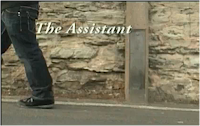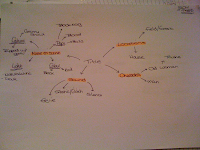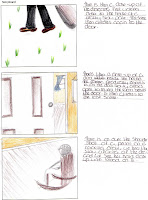Monday, 26 April 2010
Friday, 16 April 2010
Evaluation 16/04/10
My media product uses the typical convention of opening credits being shown at the beginning of a thriller film. At the beginning of my film the opening credits use typical features of that of a thriller opening sequence. For example;
-The titles move slowly during the opening sequence to create an eerie and tense feeling about the film.
-An eerie soundtrack is being played over the opening sequence while the titles are rolling to build suspense and tension.
-An unusual font is used in a color that is able to stand out during the opening sequence to create a sense of mystery.
-Enigmas are also created during the title sequence as we are shown the main character carrying the black bag.
Our opening credits are somewhat similar to a film created by Touchstone Pictures called SIGNS. We decided to base some of our ideas on this film e.g., the opening titles. SIGNS uses unusual fonts for its opening credits and also plays a very dramatic piece of music over them to help build up a sense of mystery and suspense. We too use an unusual font and have a dramatic piece of music being played while the credits are rolling to create the same effect.

Furthermore, my opening sequence challenges the conventions of a typical thriller film because throughout the clip a soundtrack is played which gives a dramatic effect and also builds up suspense and tension towards the audience. The soundtrack occasionally builds up at certain parts in the sequence to emphasize the tension of a particular scene
How does your media product represent particular social groups?
The opening to my film doesn’t focus on a particular social group per say, but if it were to it would most likely focus on working class.
Myself and the rest of my group decided to cast me as the main character of the film because we believed that I was the correct height and size of the mysterious character that we wanted to create for our storyline. It was also helpful because I was available for whenever we decided when and where we should film.
My opening sequence also focuses on particular age groups and represents them through Mise en scene. For example, I play the role of a teenager and where a costume suitable for that of an everyday teenager. I wear a simple black hoodie, a pair of denim jeans and an ordinary pair of trainers.
What kind of media institution might distribute your media product and why?
I believe an appropriate distribution company for my film would be Optimum. They work alongside the production company EM media who produce small films with low budgets e.g. This Is England by Shayne Meadows. I believe they would be interested in my film because of its dark elements such as the enigmas created through the mysterious black bag which is carried by the hooded antagonist. Although the films they have produced aren’t necessarily thriller genre films, some productions such as This Is England have dark elements as well and therefore they may show some interest in my product.
Who would be the audience of your media product?
The target audience for my film is teenagers aged 16 and above of both genders. My film consists of both male and female characters whose identities are hidden, creating a sense of mystery about them, and making it appealing to both genders. However I believe that men are most likely to find more interest in my film than women due to the fact that the main character is a young male teenager. Also because thriller films are more appealing to men rather than women because they are usually a lot more action packed and full of suspense. The female character in my film is portrayed as old and therefore women may lose interest because of the age difference between my target audience and the character herself.
My film would most likely appeal more to audiences who prefer twisted and psychological films with twists and mysterious characters.
How did you attract/address your audience?
We used a questionnaire in order to gain information on our target audience and what their preferences are in thriller films. We addressed the results of our questionnaire and acted accordingly by analyzing the information and bringing it into our storyboard by using different ideas.
For example, we made sure that there wasn’t a large cast in our performance so that the audiences are able to keep up with who is who and what their purpose is within the storyline. We also made the main character of the film a teenager so that it made the film more appealing towards audiences of the same age group.
However, if I were to of owned a larger budget I would have been able to attract my target audience using the internet, television or creating posters. Shayne Meadows advertised This Is England using posters and trailers of the film to attract his target audience. I feel this is something I may have been able to do if I had the money.

What have you learnt about technologies from the process of constructing this product?
During the production of my film I have learnt a variety of skills to do with filming, uploading and editing. I have learnt how to use a Sony DV camera for filming. I learned how to set the white balance so that the footage that we filmed was not too bright or dark and didn’t have any abnormal colors in the shot. I learned how to set the camera to widescreen so that we could upload the footage later onto the widescreen format. I also learned how to use the tripod whist filming so that the footage was not unsteady or crooked so that it made my film look more professional. After we had finished our filming, I was taught how to upload the footage from the camera and onto the computer using the adobe premier program. I learned how to create a new project and how to select the footage from the camera that I wanted to upload, and how to upload it onto our T-Drive. After uploading, I was taught how to use adobe premier pro to edit the clips that I had filmed and downloaded. I was shown how to select clips from the T-Drive and put them into my video and also how to shorten them so that they don’t play for their full duration. I was shown how to add special effects to scenes of my film to make them appear more interesting and surreal. However I also learned that technologies can sometimes be faulty and cause minor delays in production or editing. For example, some footage appeared grainy and unclear and therefore could not be used in my film. Therefore some re-filming had to be done in order to keep the sequence of clips in the correct order.
Looking back at your preliminary task, what do you feel you have learnt in the progression from it to the full product?
I believe that I have learned a variety of skills from the progression of the preliminary task. Before, when filming my preliminary task, I did not know how to set the white balance on the camera. Therefore my footage may have looked slightly off color in certain places or the lighting may have been too dark or too bright.
Below is a shot from my preliminary task. The white balance was not set during filming and so the room looks a lot darker than what it actually was. It also looks slightly grainy which makes it look a lot less professional.
Since the preliminary task, I have been able to set the white balance for filming outdoors or in brightly lit rooms and I have also learned a great deal about operating the camera whilst filming. I also feel I have learned a great deal in editing. In my preliminary task I used ordinary transitions in order to help the footage seem more professional and also so it would flow more smoothly. However, in my main task myself and the rest of the group were given the idea of using short sequences of film in order to create suspenseful transitions. This is a much better way of keeping the audience interested in the film and it is also an effective way of using transitions differently to other thriller films. I learned how to change the opacity of film clips and how to add special effects to them so that the footage appeared more surreal. This was also useful when adding in the transitions because it made them appear abstract which helped to build up the mystery and suspense of my film.
Friday, 19 March 2010
Monday, 15 March 2010
Thriller Task- Editing 15/03/10
Saturday, 13 March 2010
Thriller Task- Editing 12/03/10
Tuesday, 9 March 2010
Thriller Task-Editing 08/03/10
Sunday, 7 March 2010
Thriller task- Editing 05/3/10
We opened up our edited footage from the previous lesson so that we could begin to add in the new scenes to see how they looked together. We referred to our storyboard so that we knew what order the clips were meant to flow in and also so we knew what scenes we were going to edit first. We selected each clip accordingly by watching each one through and deciding what adaptions would be the most appropriate to go with our edited footage. We then cut off any of the unwanted footage at the beginning and the end of each of the clips and put them all together to see whether or not they flowed well. We muted all of the newly added clips so that there was no ambient sound just like the first two clips, and then we created a duplicate file of our work so that we could begin to experiment with transitions in our next lesson.
Wednesday, 3 March 2010
Thriller Task- Filming 03/03/10
We started off by going to Alex's house first so that we could begin filming our scenes there and also so we could meet up with Natasha to travel to her house later on. We started off with filming the shots located outside of Alex's house. The first shot we filmed was outisde of Alex's house along side the stone wall using a simple panning shot on the tripod for stability. This was filmed by Charlotte whilst Alex accompanied her.
We then moved onto filming the shots of myself walking up Alex's driveway towards the house. These shots were filmed by Alex while she was accompanied by Charlotte so that she could give her input. Alex filmed a long shot of me walking towards the house while she was in front of me so that it looked like I was approaching the camera. We then moved onto filming me entering the house from the outside using a panning shot. We then swapped to filming in the inside of the house on the staircase to see me walking through the house towards the living room. Charlotte filmed this part and used a panning shot to follow me into the living room whilst using a tripod so the footage was stable.
After filming all of our footage at Alex's house, we travelled to Natasha's house to begin fiming the end of our clip. I filmed the parts of Natasha and started off by using a simple tilt shot so that we are shown Natasha for the first time in her rocking chair. I used a tripod so that the footage wasn't unstable and so the tilt would be easier to film. I then filmed the hand held part from my characters point of view as he enters the room where the cloaked figure is wating for him.
Tuesday, 2 March 2010
Thriller task- Editing 01/3/10
Satisfied with the clips, we moved on to listening to the sound in each of them to decide what would be the most appropriate adaption to make. We already knew from our questionnaire and planning that we were going to have a soundtrack in our clip which was going to play throughout all of the scenes. This in mind, we agreed to mute all of the clips so that none of the ambient sound was audible when watching the footage.
With the formation and sound of the clips sorted, we moved on to adding in the opening credits to our footage. We selected an appropriate font for our clips and chose a color that would help them to stand out against the backgrounds of each clip. We had to change the color of the font for different scenes so that we could still see the credits against the background of each clip. We decided then to create a small survey of names that we could give to our film for the main title, and asked a few of our classmates for their opinions before the session ended.
Saturday, 27 February 2010
Thriller Task- Filming 26/02/10
Monday, 22 February 2010
Main Task 22/02/10
Thriller Task-Planning

![[USE.JPG]](https://blogger.googleusercontent.com/img/b/R29vZ2xl/AVvXsEhq6mqm3nmWLHJuFEK-9Bz7-vjjNHui6DDmG5JXYMXaGnvr7M-CgnHC2EhXdBOmjH6yTLmbM1pQnom1SefrScJJOXSoHEhEvokDb1Uj5keXi8bh_kSaBx9OcyIMMVfvo22KvO8gE7cx4JmP/s1600/USE.JPG)
This is the mind map that myself and the rest of the group created to put all of our ideas together so that we could start producing our clip. This one was the first draft.
 This is the second part of the storyboard that we made after planning our rough draft.
This is the second part of the storyboard that we made after planning our rough draft.This is the first part of the storyboard that we made after finishing our rough draft.
Thriller Task- Planning
In our footage we are using a minimal amount of props so that our clip gains a more mysterious effect. We have decided that we are only going to use three props. They are;
A shawl (For Natasha's character)
A plastic black bag (For my character when he is dragging it across the floor. We are going to put a heavy object inside so that makes it look more realistic.)
A rocking chair (For Natasha's charater when we see her rocking back and forth.)
Thriller Research
Thriller is a broad genre of literature, film and television that includes numerous and often overlapping sub-genres Thrillers are characterized by fast pacing, frequent action, and resourceful heroes who must thwart the plans of more powerful and better equipped villains. Writer Vladimir Nabokov, in his lectures at Cornell University, said that "In an Anglo-Saxon thriller, the villain is generally punished, and the strong silent man generally wins the weak babbling girl, but there is no governmental law in Western countries to ban a story that does not comply with a fond tradition, so that we always hope that the wicked but romantic fellow will escape scot-free and the good but dull chap will be finally snubbed by the moody heroine.
Characteristics
Thrillers often take place wholly or partly in exotic settings such as foreign cities, deserts, polar regions, or high seas. The heroes in most thrillers are frequently "hard men" accustomed to danger: law enforcement officers, spies, soldiers, seamen or aviators. However, they may also be ordinary citizens drawn into danger by accident. While such heroes have traditionally been men, women lead characters have become increasingly common; for an early example see Sigourney Weaver's character Ripley, in the movie Alien, 1979.
Thrillers often overlap with mystery stories, but are distinguished by the structure of their plots. In a thriller, the hero must thwart the plans of an enemy, rather than uncover a crime that has already happened; while a murder mystery would be spoiled by a premature disclosure of the murderer's identity, in a thriller the identity of a murderer or other villain is typically known all along. Thrillers also occur on a much grander scale: the crimes that must be prevented are serial or mass murder, terrorism, assassination, or the overthrow of governments.
Examples of thriller types
• Action thriller: In which the work often features a race against the clock, contains lots of violence, and an obvious antagonist. These films usually contain large amounts of guns, explosions, and large elaborate set pieces for the action to take place. These films often have elements of mystery films and crime films but these elements take a backseat to action. Notable examples are the James Bond films, The Transporter, and the Jason Bourne novels and films.
• Conspiracy thriller: In which the hero/heroine confronts a large, powerful group of enemies whose true extent only he/she recognizes. The Chancellor Manuscript and The Aquitane Progression by Robert Ludlum fall into this category, as do films such as Three Days of the Condor, Capricorn One, and JFK.
• Crime thriller: This particular genre is a hybrid type of both crime films and thrillers that offers a suspenseful account of a successful or failed crime or crimes. These films often focus on the criminal(s) rather than a policeman. Crime thrillers usually emphasize action over psychological aspects. Central topics of these films include murders, robberies, chases, shootouts, and double-crosses are central ingredients. Some examples include The Killing, Seven, Reservoir Dogs, Inside Man, and The Asphalt Jungle.
• Disaster thriller: In which the main conflict is due to some sort of natural or artificial disaster, such as floods, earthquakes, hurricanes, volcanoes, etc., or nuclear disasters as an artificial disaster. Examples include Stormy Weather by Carl Hiaasen, Tremor by Winston Graham, and the 1974 film Earthquake.
• Drama thriller: In which the story consists of the elements of a thriller and drama film. These films are usually slower paced and involve a great deal of character development along with plot twists. Examples include The Illusionist, The Interpreter and The Prestige.
• Science-fiction thriller: Alien and Kim Stanley Robinson's Mars Trilogy and Ian Irvine's Human Rites Trilogy and Dasavathaaram are examples of science-fiction thrillers.
• Horror thriller: In which the main character is put in danger and their main enemies are unrealistic creatures in which they must destroy to achieve their goal. Films such as Evil Dead 2 and Zombie 2 fit into this genre of thriller.
• Erotic thriller: In which it consists of erotica and thriller. It has become popular since the 1980s and the rise of VCR market penetration. The genre includes such films as Basic Instinct, Dressed to Kill, Color of Night, Eyes Wide Shut, Fatal Attraction, Looking for Mr. Goodbar, Obsessed, and In the Cut.
( The source where I gathered all of my research was from wikipeida: http://en.wikipedia.org/wiki/Thriller_(genre )
Thriller Task- Planning
| To reduce the risk of injury, all people involved should be careful when walking, especially when walking with heavy equipment and around areas with uneven ground and fallen debris. | |
Drowning | Cast members and crew should take extra precaution when filming next to the river to avoid situations such as falling in. | |
Damage to equipment | All participants must take extra care when handling filming equipment so that no damage takes place. | |
Illness | If a member of the cast or crew falls ill and is unable to attend an arranged date, a replacement should be considered or a new date should be proposed. | |
Weather conditions | If the weather is unsuitable at the proposed date of filming, indoor scenes should be filmed instead and conditions should be coped with as best as possible. Crew should make sure no filming equipment is damaged due to weather. | |
Assault | If any scenes should be filmed at night, crew and cast must take safety measures in order to stay as safe as possible when filming outside to reduce the risk of an unwanted event taking place. |
Sunday, 21 February 2010
Thriller Task - Planning
Natasha Hoskins
Natasha will be playing the role of the mysterious woman found at the end of the clip rocking back and forth in a rocking chair. She is shrouded in a shawl and only her hands and eye are visible to the audience. We chose Natasha because she was an available actress who also lives close to our chosen filming locations.
Shaun Cutts
 Shaun will be playing the role of the hooded character in our footage. He will be wearing a black jumper and his hood will remain up throughout all the scenes he appears in so that his face is not visible at any point during the clip. We chose to use Shaun for this role because he has some acting experience and is also available for recording when we need to film because he is a member of our group.
Shaun will be playing the role of the hooded character in our footage. He will be wearing a black jumper and his hood will remain up throughout all the scenes he appears in so that his face is not visible at any point during the clip. We chose to use Shaun for this role because he has some acting experience and is also available for recording when we need to film because he is a member of our group.Questionnaire
| Do you prefer thrillers to be fast or slow paced? | 7 | 3 |
| Would you prefer minimal dialogue, or a substantial amount of dialogue? | 7 | 3 |
| Do you enjoy suspense or surprise? | 6 | 4 |
| Would a thriller be better with a few key characters, or a large cast? | 10 | 0 |
| Do you prefer dark environments, or lighter ones? (shot at night or in the daytime) | 5 | 5 |
| Do you prefer action-based thrillers or horror-based thrillers? | 8 | 2 |
| Would you prefer it to be shot realistically (as if you’re there) or abstract? | 9 | 1 |
| Would you prefer a soundtrack? | | |
| If YES, would you like a subtle or climatic soundtrack? | 3 | 5 |
| Would you prefer our characters’ identities to be hidden or clearly obvious from the beginning? | 10 | 0 |
| Would you prefer opening credits or not? | 10 | 0 |
| If YES, would you prefer them to roll quickly or slow to build tension? | 2 | 8 |
| Which font would you prefer? | FONT FONT FONT FONT | 1 2 6 |
| Where would you prefer it to be set? | Forest 1 House 0 | Lake/riverside 7 Attic 2 |
This is the questionnaire that myself and the rest of the group created in order to get a further insight of our target audiences opinions and preferences of thriller films.










